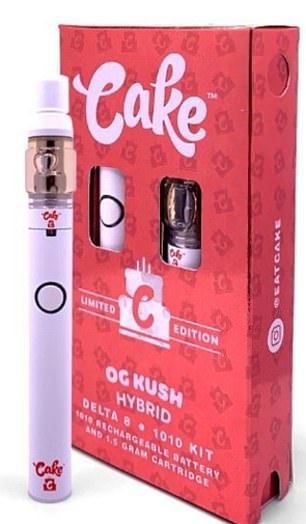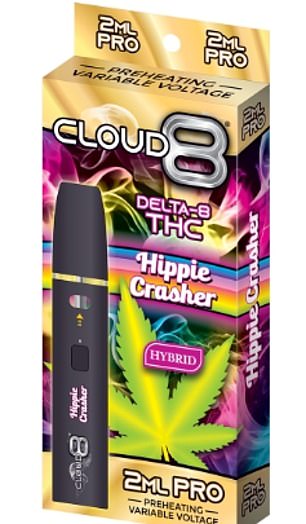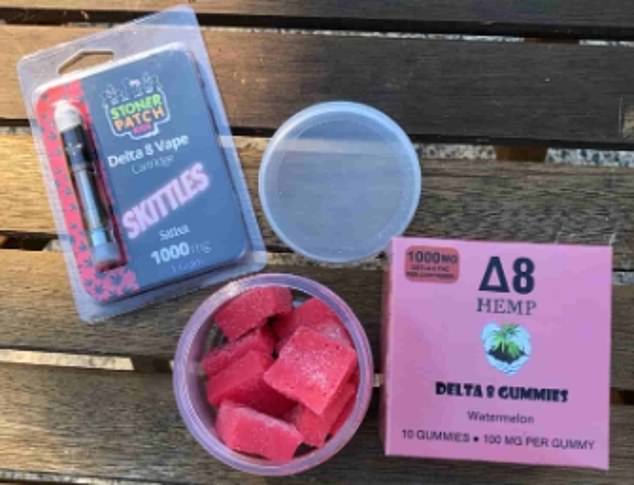Delta-8 THC, the synthetic cousin of the delta-9 strain that gives marijuana its psychoactive effect, has become easily available to children online.
Hemp-derived oil is available in vaping and edible varieties, with manufacturers taking a leaf from the e-cigarette industry’s marketing playbook, making the product appealing to children.
New York researchers combed dozens of websites selling legal delta-8 products and found that almost all of them failed to properly verify the age of buyers, keeping prices low enough that even a weekly allowance could cover them and specifically sought to attract young people with dynamic products. cartoonish packaging.
Delta-8 products contain what users claim is a milder alternative to tetrahydrocannabinol (THC) found in marijuana, giving them a more relaxing effect without paranoia or anxiety. Some have taken to calling it a “diet herb.”
But whether the hemp-derived chemical is harmless has been a debate for years, as calls to poison control centers about delta-8 number in the thousands each year. And the lack of regulation around its manufacture and sale to children is the biggest concern among public health experts.
Delta-8 products are often packaged in an attention-grabbing way, especially for impressionable young people who may not know exactly what they are consuming.


Similar to the packaging of nicotine vapes and e-cigarettes, delta-8 vapes are colorful with catchy names
A decade ago, a walk past smoke shops and convenience stores revealed large displays of brightly colored nicotine vapes packaged in packages adorned with cartoon characters or technicolor renderings of fruit and candy.
Ten years later, the windows look the same, but the products have changed. Delta-8 vape pens and edibles routinely come packaged in brightly colored bags and cartons with flashy names like Caviar, Cake, and Cloud8.
Its legal status is also attractive to consumers and business owners in states where marijuana is not fully decriminalized, because they can stock shelves with vapes, gummies, and more without breaking any laws.
Online marketplaces are no different. Researchers at Hofstra University found that of 45 delta-8 retail websites, more than half sold their products in child-friendly packaging.
Dr. Ruth Milanaik, a pediatrician and Hofstra professor who led the study, said: What concerns me most about Delta-8 products is the fact that delta-8 dispensers appear to be competition to produce packaging that will attract the attention of adolescents.
It is essential that more regulations are put in place to ensure that these products are not attractive to teenagers.
The researchers also found that only 29 of 45 sites asked customers to verify their age before browsing. Nearly all of the sites, 43 in total, had no formal measures of third-party age verification, typically separate companies dedicated to helping businesses comply with age-related retail requirements.
Nearly all sites sold edibles and vaping products, while just under half of sites sold delta-8 tinctures, concoctions of delta-8 oil extracted from the cannabis plant diluted in another oil such as hemp seed oil to place under the tongue. .
Most of the products sold on these sites are extremely cheap.
Fifteen sites’ cheapest products cost less than $5, and almost all sell delta-8 for less than $20.
And online sellers offered the cheapest products with the highest concentrations of delta-8 THC.
Among the least expensive products at each site, four contained up to 30 mg of D8 and one contained between 31 and 40 mg.
Ten of the least expensive products contained between 41 and 50 milligrams of D8, and 21 of them contained 51 milligrams or more of D8.
Nine of them did not indicate any dosage.
The researchers said: The lack of age verification before allowing users to purchase D8 products is extremely concerning.
The low prices, high dosages available, and stunning packaging make these products extremely attractive to teens looking for a high.
The free-for-all legal landscape has resulted in thousands of calls to poison control centers.
From January 1, 2021 to February 28, 2022, there were more than 2,300 calls to poison centers regarding delta-8 exposures.
The majority of these calls involved adults, but 41 percent involved minors.
Forty percent of calls involved unintentional exposure, such as taking the medication by mistake. Of that 40 percent, more than eight in ten involved children.
The federal Food and Drug Administration (FDA) has issued consumer warnings about delta-8, which falls outside the agency’s oversight jurisdiction, meaning manufacturers can get away with tampering with products with other synthetic chemicals or even with the federally illegal delta-9 THC variety. .
There’s not much more the FDA can do because, under the 2018 Farm Bill that legalized hemp, delta-8 is not a criminalized substance.
Hemp comes from the cannabis plant, just like marijuana, which millions of people use recreationally or medicinally. But unlike marijuana, hemp does not produce delta-9 THC.
The bill stated that hemp could be legally grown as long as its THC content remained below 0.3%.
Lawmakers defined THC specifically as the delta-9 variety that remains federally illegal and did not address its calmer cousin, delta-8, which is extracted from hemp-derived CBD.
#Synthetic #weed #claims #give #anxietyfree #effects #marketed #children #poisons #thousands #people #year #doctors #warn
Image Source : www.dailymail.co.uk

